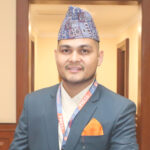Kathmandu: Once a modest buffalo herder from Aathrai, Tehrathum district in eastern Nepal, Durga Prasai now commands a billion-rupee business empire.
A self-made entrepreneur turned political firebrand, Prasai’s journey from animal husbandry to the corridors of power, controversy, and ultimately incarceration, has become one of Nepal’s most compelling modern business and political sagas.
Durga Prasai first made his mark in Nepal’s health sector with B&C Medical College, a bold private venture in Jhapa aimed at revolutionizing medical education and healthcare in the eastern region.
With backing from political heavyweights like KP Sharma Oli and Pushpa Kamal Dahal ‘Prachanda’, Prasai once dined with the nation’s top communist leaders at his home, serving them the famed Marsi rice. However, this spotlight soon dimmed.
From empire builder to political dissenter
Having borrowed billions from banks to fund his hospital and cancer centre projects, Prasai’s dream started to crumble when the government refused to grant affiliation to his medical college despite issuing a Letter of Intent (LOI). Citing unmet regulatory requirements, the Medical Education Commission withheld the affiliation, triggering a decade-long legal battle.
Prasai claimed injustice and took the matter to the Supreme Court of Nepal, where his petition was rescheduled 47 times. His business began to suffer as loans mounted and institutions questioned his credibility. Once a respected businessman, Prasai became increasingly combative—blaming politicians, switching parties, and leading fiery anti-bank campaigns.
He began inciting borrowers to default on their loans, reportedly refusing to repay over Rs 7 billion owed to eight banks including Prabhu Bank, Global IME, Kumari Bank, and Nabil Bank. His behavior turned erratic, making threats against high-ranking officials, including the Governor of Nepal Rastra Bank.
A Supreme Court victory and business rebirth
In March 2024, Prasai won a landmark case when the Supreme Court ordered that B&C Medical College be granted affiliation in time to enroll students. Kathmandu University and the Medical Education Commission complied in May and June 2024 respectively.
This legal breakthrough reversed his declining fortunes. B&C started MBBS classes from January 2025, reviving revenue streams and restoring investor confidence. Banks began receiving regular loan installments once again.
Prasai’s son, Nirajan, had taken over the company’s operations while his father ventured deeper into politics. Under Nirajan’s management, B&C’s financial performance improved significantly. The institution restructured Rs 3.47 billion in loans and recovered its previously withdrawn credit ratings.
Nirajan, a medical and management professional, now serves as Managing Director of B&C. The company’s revenue grew by 11 percent in FY 2023/24, recording over Rs 925 million in trade, mainly driven by hospital services and health insurance enrollment. The company’s Atrium Hotel is also expected to open within a year.
Arrest and political extremism
While Nirajan stabilized the business, Durga Prasai descended further into political radicalism. After launching a royalist movement in early 2023, Prasai led a mass protest in Kathmandu’s Tinkune in February 2025, during which two people died and millions in public and private property were damaged. Prasai went into hiding and was later arrested in India.
Currently in pre-trial detention, Prasai faces charges of inciting violence, issuing threats to officials, and damaging public property. Despite being behind bars, his son continues to steer B&C toward stability.
Business, politics and personal ties
Prasai’s story is deeply entwined with family and political drama. A school dropout with no formal medical training, he initially found success in dairy farming using buffalo breeds imported from India. After early loans failed and he was denied further credit, he aligned with Maoist rebels during the civil war—reportedly using them to pressure his in-laws for ancestral property rights.
He later built B&C Hospital on that very land, initially with financial partners whom he later ousted. Prasai’s in-laws, once powerful tea estate owners, were forced to concede property following Maoist pressure and court rulings in his favour.
Over time, his conduct became increasingly erratic. His royalist revival campaign included theatrical acts—trying to bring King Gyanendra to Jhapa, presenting a golden staff to the UAE Crown Prince, and publicly berating politicians and bankers on social media.
His catchphrases—calling for the cancellation of interest on loans and a total debt write-off for borrowers up to Rs 2 million—resonated with a frustrated populace, but alienated banks and regulators. Securities Board of Nepal (SEBON) and law enforcement authorities closely monitored his activities.
The future: Nirajan’s stewardship
Now, Durga Prasai’s political future remains uncertain as he fights legal battles from behind bars. Yet, his business legacy is finding a new direction under Nirajan, whose professional and disciplined management style has gained the trust of bankers and partners.
One banker noted, “Even though Durga Prasai is in custody, his son’s active leadership is commendable. At least we’re receiving regular interest payments again.”
Prasai is reportedly in the process of legally transferring his business holdings to Nirajan.



Comment Here